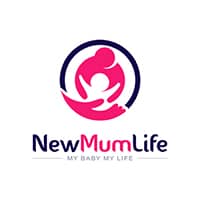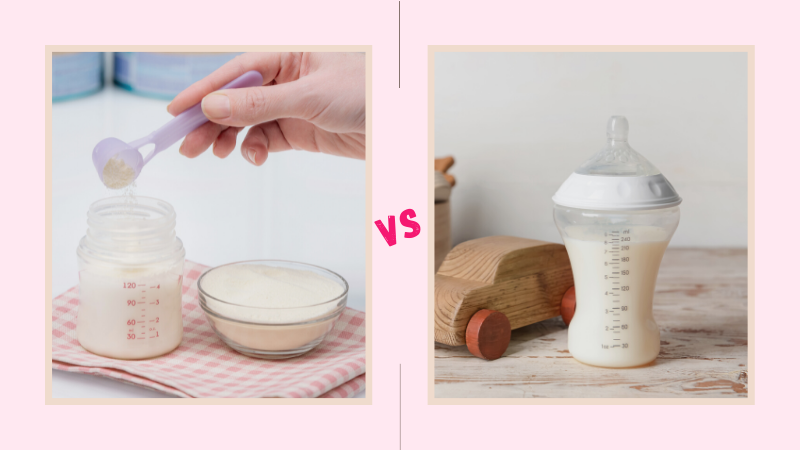We are always in a dilemma when it comes to choosing the right type of milk feed for the baby. Formula milk vs cow milk; which one to opt for? Get the answers to all your questions in this article.
General Guidelines
The AAP (American Academy of Pediatrics) recommends certain important guidelines:
- A baby less than 6 months old should exclusively be breastfed or formula-fed.
- After the baby turns 6 months, supplement with solids in addition to breast milk or formula milk.
- As the baby turns 1 year old, you can start with cow milk in addition to feeding solids.
- Limit the intake of cow milk to 2-3 cups (16-24 ounces) each day. More quantities of cow milk hinder the absorption of iron and may lead to iron deficiency.
How Cow Milk Is Different From the Formula?
Formula and cow milk differ a lot in their composition:
- Protein: Cow milk has 2.5x more protein than formula. It is perfect for the baby cow but difficult to digest for the human baby. If given early, this puts extra stress on the baby's digestive health.
- Whey: Casein ratio: In cow milk, this ratio is 20:80 while in the formula, it is 60:40. Whey protein is easily digestible and is less allergic. Casein protein is difficult to digest and more allergic. Hence, a high casein ratio leads to constipation or colic in babies.
- Carbohydrate: Carbohydrate in cow milk is 4.65 gm/100 ml while in formula milk, it is 8 gm/100 ml. It has mainly lactose that breaks down into glucose and galactose. Lactose is highly beneficial for the baby.
- Iron: Cow milk is very low in iron. It will just fill the baby's hunger and may lead to anemia or poor weight gain.
- Vitamin C: Cow milk is again low in Vitamin C. Therefore, introducing it early, does not guarantee good immune health of the baby. In addition, low quantities of Vitamin C result in less absorption of iron in the body.
- Fresh preparation: Formula is always prepared fresh as and when required by the baby. However, one cannot guarantee freshness with cow’s milk.
Can I Dilute Cow Milk With Water and Feed My Baby?
Adding water to cow milk, no doubt reduces the number of proteins. However, it also decreases the fat content along. Feeding this hypocaloric milk to babies has a negative result.
Can I Give Cow Milk to a Newborn?
No, feeding cow milk to a newborn is not recommended at all. A baby’s digestive system is not completely developed. Hence, it is very difficult for the baby to digest the proteins in cow’s milk. It may also cause allergic reactions or result in iron deficiency.
Can I Feed Cow Milk-Based Products to My 6 Months Old?
Yes, you can feed cow milk-based products to your baby once you start with feeding solids. These can be curd, cheese, etc. as their preparation method is such that breaks down the proteins and make them easy to digest.
Is Formula Better Than Cow’s Milk After 1 Year?
One-year-olds do not need formula anymore. You should switch to whole milk instead. Till the baby reaches 1 year, use a combination of solid foods and breast milk/formula.
Is formula milk good for a baby?
Formula feeding is the best alternative for mothers who are unable to breastfeed. Most of the commercial formulas are prepared under sterile conditions that are safe for the baby and use a combination of proteins, vitamins, minerals, fats, and sugars.
A formula-feeding newborn is as healthy as a breastfed baby. The modern baby formula options are wholesome and serve as the perfect foods for infants. It is the healthiest alternative to breastfeeding available today. There is nothing wrong in case a baby is fed well, is happy, and gaining normal weight.
Is Ok to Feed Both Breastmilk and Formula?
Yes, you can. Formula milk can very well supplement breastfeeding and both can be given simultaneously to the baby.
Can I Replace Formula With Cow’s Milk?
No. you can never replace formula with cow’s milk. Use cow milk only after your baby turns 1 year of age. Though you can give cow milk-based foods when the baby turns 6 months old, never use it as the main drink.
Always formula feed or breastfeed the baby till it reaches 1 year of age. Later, you can start with cow milk.
Is Mixed Feeding Better Than Just Formula?
Yes. Breastfeeding is the best option to choose as it gives the baby the required nutrients required for its development. Mother’s milk is exclusively meant for the baby. However, if you cannot exclusively breastfeed, opt for mixed feeding.
What Are the Disadvantages of Using a Formula?
The formula is expensive and not everyone can afford it. It has no antibodies and can never replicate breastmilk completely. In addition, formula feeding does require the use of extra equipment like baby feeding bottles and sterilization of the feeding equipment.
Which Is the Best Formula Milk in India?
Check out the best formula milk in India for babies. We have considered the reviews of different mothers before selecting them in our top list.
Does Formula Cause Obesity?
It is usually assumed that formula-fed babies are obese.Obesity, however, is a parenting issue. What you all need to observe are the careful feeding practices under your doctor’s consultation.
What Can I Give Baby Instead of Milk?
There are many alternatives to cow milk – soy milk, coconut milk, or almond milk.
Is My Baby Allergic to Cow’s Milk?
There are some symptoms to watch out for while you give cow milk to your 1-year-old. Look for skin reactions such as itchy rashes, swelling of the face, around the eyes, or lips, stomach ache, colic, diarrhea, constipation, and vomiting.
We hope this article solves all types of your queries related to formula milk vs cow milk. If you have any other questions, do let us know in the comments section below. Also, let us know which formula milk, in case you are using, have you chosen for your baby.
About The Author

NewMumLife Team
NewMumLife is a parenting website for moms, dads and child care. We aim to offer a place to connect parents and parents-to-be for all types of parenting advice and suggestions to the questions they normally face. Our content is for the parents and by the parents where they share their personal experiences to benefit our parenting community.

